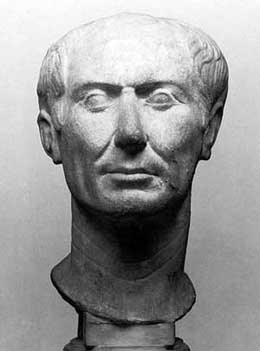
/death-of-julius-caesar-1805-1806-by-vincenzo-camuccini-1771-1844-oil-on-canvas-400x707-cm-165533961-57b4900f5f9b58b5c2c5cf7a.jpg)
So perhaps he desired a famous death that was fitting for such an accomplished general and politician. It's fair to say he must have known the senators despised him. He had become increasingly riddled with ongoing health issues. It was well documented that Caesar, at age 56, had severe epilepsy. Some historians have surprisingly suggested that he knew of the plan and was prepared to meet his gruesome fate. The Senate declared him the first emperor with the name Augustus. Octavian would eventually emerge as the sole victor and seized total power. Another bloody civil war broke out between the conspirators and his adopted son Octavian and loyal friend, Mark Antony. But Caesar's loyal supporters quickly overwhelmed them, and they were forced to flee the city. They escorted the assassins to Capitoline Hill and guarded the perimeter in the tense days that followed. He owned a group of gladiators who were used as their private bodyguards. In William Shakespeare's eponymous play, Caesar supposedly whispers to his close friend, "Et Tu, Brute?"-the Latin phrase meaning, "you too, Brutus?"įollowing the assassination, Decimus provided security to all of the killers. The conspirators took turns stabbing him, inflicting a total of 23 fatal wounds. Caesar tripped and fell to the ground while trying to flee. A group of conspirators held daggers and quickly surrounded him. Shortly before entering the senate meeting, Caesar suddenly dismissed his bodyguards and entered the room unarmed. As many as sixty of the country's leading noblemen participated in the treacherous act.

The assassination took place at a hall next to Pompey's Theatre on the Ides of March, a religious holiday now synonymous with the downfall of Caesar. The plan relied on ambushing Caesar while traveling to a senate meeting. Less than five years later, Cassius Longinus and Marcus Brutus led a conspiracy to assassinate the dictator. But his policies in government only served to reignite old rivalries and suspicion within the Senate. Upon returning to Rome, the remaining senators declared Julius Caesar as dictator for life. On August 8, 48 BC, Caesar decisively beat his rivals at the Battle of Pharsalus. His political enemies led by Pompey the Great immediately fled the capital to regroup in the east. In January 49 BCE, he famously crossed the Rubicon River with the Legion XIII. Knowing this was likely a trap, Caesar decided to return home, but at the head of an army. After ten years of campaigning, the Senate ordered him to return to the capital and disband his army. His legions also became the first Roman soldiers to cross the English Channel into Britain. Caesar destroyed the Gallic rebellion led by Vercingetorix at the Siege of Alesia. He rose to power and fame after conquering the entire region of Gaul (present-day France and Belgium).

Gaius Julius Caesar was the most famous general and politician of the Roman Republic. Today on March 15, 44 BCE, Roman senators ambushed and stabbed Julius Caesar to death-beware, the Ides of March!


 0 kommentar(er)
0 kommentar(er)
